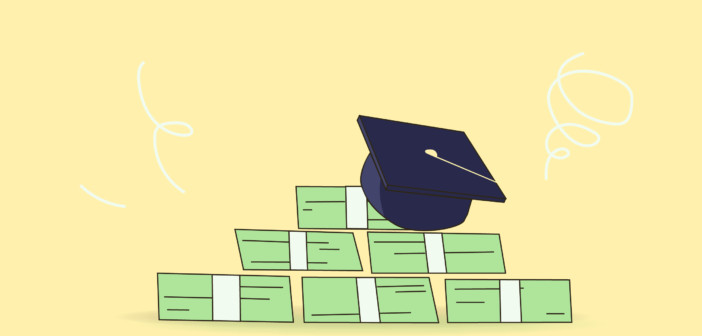College: the time of your life. A party for some, a money pit for others. For 2020 graduates, their average federal debt is about $36,510. Starting salaries, if hired quickly after graduation, range from only $24,500- $37,500. It seems to be a difficult task for a recent graduate to tackle their debt and start their adult life. The necessities of paying rent, buying insurance and covering the regular costs of living. As we watch the national total for student loan debt rise beyond $1.8 trillion, how will graduates overcome their loans?
The controversy
The idea of a nationwide forgiveness of student debt has been up for debate for years. As the price of tuition skyrocketed and inflation increased across the board, young adults scrambled for a solution. The debate is still a hot topic on all sides of the political compass, with a wide range of opinions. Many of the published opinions are those of politicians and financial experts. Yet, the people who would actually be affected by this proposal are not in the spotlight. What do the graduates currently paying off their debts have to say? How do current students feel about a future where they may be forgiven for their federal loans? And what about those graduates who have already paid their debts?
Biden’s promise
During his campaign, President Joe Biden promised a form of student loan cancellation.
Biden promised to “forgive all undergraduate tuition-related federal student debt from two- and four-year public colleges and universities and private HBCUs and MSIs for debt-holders earning up to $125,000,” said Politifact, which is part of The Poynter Institute.
These plans have been stalled. Biden made no mention of federal student loan cancellation in his State of the Union Address on March 1.
The aftermath of student loans
Chris Ferraro attended Ferris State University in Grand Rapids, Mich. and the University of North Carolina in Chapel Hill, N.C.. He received his bachelor’s degree in marketing in 2009 and his master’s degree in business administration in 2019, and is still paying off his total of nine loans. He is now a financial adviser at Northern Trust Corporation and is raising three young children with his wife. Ferraro feels fortunate to be in a position where his debt is not a heavy burden on him and his family, but he recognizes that his luck could change at any moment.
“I have a lot of debt, but it’s manageable,” he said.
Ferraro estimates that at the rate he is paying, it will take him another 19 years to pay off the sum of his debt. “The loan term is so long, I try to put a little bit extra toward the principle, to eat away at that a little bit. Any extra money I have, I’d rather invest than put toward loans, because the interest rates are still so low, and I can get a better return than I’m paying on loans,” said Ferraro.
When asked whether a nationwide forgiveness plan would benefit him, Ferraro said, “I would love it if it got forgiven, but I don’t think it’s realistic.” He believes that the government will not pass any sort of student debt forgiveness plan because it is too difficult to find the extent of aid they will provide, “they don’t know where to draw the line.”
Is student loan debt forgiveness the right call?
Marissa Gaigalas, assistant director of First-Generation Programs & coordinator of Dunham Scholars at NCC, has recently finished paying off her student loans. She graduated from Aurora University with a B.A. in criminal justice in 2008 while only taking out one loan. Gaigalas also attended NCC for her master’s degree in professional business studies, finishing that degree in 2020. She did not need to take out loans for her master’s program because she worked as a graduate assistant and her tuition was covered.
It took Gaigalas two years to pay off her loans, and she said that her frequent low payments helped her maintain financial security. “The loan came first, then car payments, apartment, etc.,” Gaigalas said.
She was not aware of the recent discussions of national student loan forgiveness. Gaigalas prefers to stay neutral on the topic, saying “Everybody is on a case-by-case basis”. She said that she recognizes some people would need loan forgiveness, but also sees how some people may take advantage of it without having the need.
The stress of student loans
Rachel Wells, currently a third-year student at the University of New Hampshire, is less-than-excited to begin paying off the loans she has taken out. In her college career so far, Wells has taken out one loan each semester. She is currently working on her bachelor’s degree in communication sciences and disorders. Wells plans to continue with her master’s in speech and language pathology.
Wells said student loans will play a role in her decision to attend graduate school. “I’m definitely more cautious about which schools I want to attend. Affordability is important and I’m mainly looking at schools that will be realistic cost-wise,” she said.
Wells had anticipated that she would need to take out loans long before she attended college.
“My older sister had to take out loans and I knew the finances of my family. I knew it was unrealistic for them to pay for it all so I knew I would have to take out loans. And they pushed me to fill out the FAFSA form,” she said.
Since Wells is attending a public university, she could reap the benefits of a passed student loan forgiveness plan. She is not optimistic that this will happen, but she still hopes for it.
A recent poll shows 60 percent voter support for some form student loan debt forgiveness. The Student Borrower Protection Center shows the demographics and political alignments of voters and their opinions.

